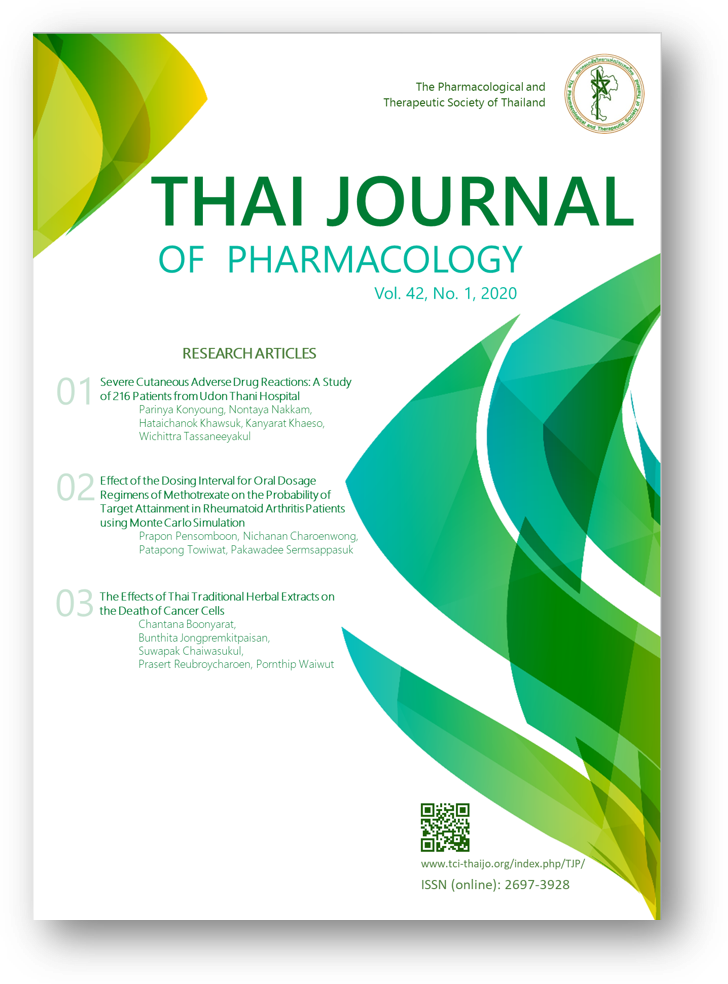The Effects of Thai Traditional Herbal Extracts on the Death of Cancer Cells
Main Article Content
Abstract
Cancer is a major health problem in Thailand; thus, there is a need to find and develop new active ingredients from plants for the inhibition of cancer cell proliferation. This paper reports an investigation into the effects on cancer cell proliferation of leaf extracts of five Thai traditional herbal plants: Cratoxylum formosum, Limnophila geoffrayi, Aegle marmelos, Syzygium gratum and Fagraea fragrans. The cytotoxic effects of the extracts on colon adenocarcinoma cells (HT-29), hepatocellular carcinoma cells (HepG2) and normal colon cells were measured by 3-(4,5-dimethylthiazol-2-yl)-2,5-diphenyltetrazolium bromide (MTT) assay and the cell morphology was assessed by using phase-contrast microscopy. The signaling protein levels in apoptosis pathway were investigated by western blot analysis. The results showed that L. geoffrayi extract significantly induced the deaths of HT-29 cells (p<0.001) and HepG2 cells (p<0.05) with IC50 levels of 0.57±0.03 mg/mL and 0.57±0.01 mg/mL, respectively. C. formosum extract significantly induced HT-29 cell death (p<0.01), with an IC50 of 0.87±0.03 mg/mL. A. marmelos extract significantly induced HepG2 cell death (p<0.05) with an IC50 of 0.76±0.02 mg/mL. Moreover, these three extracts showed no significant cytotoxic effects towards the normal colon cells. In apoptosis pathway, L. geoffrayi and C. formosum extracts decreased the level of X-linked inhibitor of apoptosis protein (XIAP) as well as induced caspase-3 activation in HT-29 cells. In HepG2 cells, L. geoffrayi and A. marmelos extracts up-regulated death receptor 5 (DR5) level and inhibited the XIAP in correlation with caspase-3 activation. This study indicated that L. geoffrayi, C. formosum and A. marmelos leaf extracts at the concentrations up to 1 mg/mL induced cancer cell deaths without any cytotoxic effects on normal colon cells.
Article Details
Upon acceptance of an article, the Pharmacological and Therapeutic Society of Thailand will have exclusive right to publish and distribute the article in all forms and media and grant rights to others. Authors have rights to use and share their own published articles.
References
Tait SWG, Green DR. Mitochondria and cell death: outer membrane permeabil-ization and beyond. Nat Rev Mol Cell Biol. 2010 Sep;11(9):621-32.
Khuhaprema T, Srivatanakul P. Colon and rectum cancer in Thailand: an overview. Jpn J Clin Oncol. 2008 Apr;38(4):237-43.
Crockett SD, Nagtegaal ID. Terminology, molecular features, epidemiology, and management of serrated colorectal neoplasia. Gastroenterology. 2019 Oct; 157(4):949-66.
Lurje I, Czigany Z, Bednarsch J, Roderburg C, Isfort P, Neumann UP, et. al. Treatment strategies for hepatocellular carcinoma - a multidisciplinary approach. Int J Mol Sci. 2019 Mar 22;20(6):1465.
Feitelson MA, Arzumanyan A, Kulathinal RJ, Blain SW, Holcombe RF, Mahajna J, et al. Sustained proliferation in cancer: mechanisms and novel therapeutic targets. Semin Cancer Biol. 2015 Dec:35(Suppl):S25-S54.
Hsing AW, Chokkalingam AP, Gao YT, Madigan MP, Deng J, Gridley G, et al. Allium vegetables and risk of prostate cancer: a population-based study. J Natl Cancer Inst. 2002 Nov 6;94(21):1648-51.
Gonzalez CA, Pera G, Agudo A, Bueno-de-Mesquita HB, Ceroti M, Boeing H, et al. Fruit and vegetable intake and the risk of stomach and oesophagus adenocarcinoma in the European Prospective Investigation into Cancer and Nutrition (EPIC-EURGAST). Int J Cancer. 2006 May 15;118(10):2559-66.
Grodner A. Thai herbal folk medicine: for the serious student. Scotts Valley: CreateSpace Independent Publishing Platform; 2014.
Sanusi SB, Bakar MFA, Mohamed M, Sabran SF, Mainasara MM. Southeast Asian medicinal plants as a potential source of antituberculosis agent. Evid Based Complement Alternat Med. 2017;2017:7185649.
Rahman S, Parvin R. Therapeutic potential of Aegle marmelos (L.)-an overview. Asian Pac J Trop Dis. 2014 Feb;4(1):71-77.
Sain S, Naoghare PK, Devi SS, Daiwile A, Krishnamurthi K, Ariigo P, et al. Beta caryophyllene and caryophyllene oxide, isolated from Aegle marmelos, as the potent anti-inflammatory agents against lymphoma and neuroblastoma cells. Antiinflamm Antiallergy Agents Med Chem. 2014 Mar;13(1):45-55.
Meephat S, Maneesai P, Bunbupha S, Prachaney P, Kukongviriyapan U, Pakdeechote P. Effect of Syzygium gratum extract on blood pressure and endothelium-dependent vasorelaxation in nitric oxide-deficient rats. Srinagarind Med J. 2018;33(1):38-42.
Thummajitasakul S, Tumchalee L, Koolwong S, Deetae P, Kaewsri W, Lertsiri S. Antioxidant and antibacterial potentials of some Thai native plant extract. Int Food Res J. 2014;21(6):2393-8.
Jonville M, Baghdikian B, Ollivier E, Angenot L, Frédérich M, Legault J. Anti-inflammatory potency of the traditionally used antimalarial plant Fagraea fragrans. In: Kolodziej H, Melzig MF, editors. 7th Tannin Conference (Pre-symposium) and 58th International Congress and Annual Meeting of the Society for Medicinal Plant and Natural Product Research [Internet]; 2010 Aug 29-Sep 2; Berlin, Germany. Stuttgart: Georg Thieme Verlag KG; 2010 [cited 2020 Apr 16]. p. WSI_6. Available from: https://www.thieme-connect.com/products/ejournals/ issue/10.1055/s-002-21285/grouping/017711/10.1055/s-00000058
Apisantiyakom S. Isolation and identification of bioactive chemical constituents of the root bark of Fagraea fragrans Roxb. J Sci Ladkrabang. 2013;22:68-83.
Berridge MV, Tan AS. Characterization of the cellular reduction of 3-(4,5-dimethylthiazol-2-yl)-2,5-diphenyltetrazolium bromide (MTT): subcellular local- ization, substrate dependence, and involvement of mitochondrial electron transport in MTT reduction. Arch Biochem Biophys. 1993 Jun;303(2):474-82.
Bradford MM. A rapid and sensitive for the quantitation of microgram quantities of protein utilizing the principle of protein-dye binding. Anal Biochem. 1976 May 7;72:248-54.
Poeaim S, Areekul V, Putthawan P. Cytotoxic activity and apoptotic induction of some edible Thai local plant extracts against colon and liver cancer cell lines. Trop J Pharm Res. 2017;16(12):2927-33.
Nonpunya A, Weerapreeyakul N, Barusrux S. Cratoxylum formosum (Jack) Dyer ssp. pruniflorum (Kurz) Gogel. (Hóng yá mù) extract induces apoptosis in human hepatocellular carcinoma HepG2 cells through caspase-dependent pathways. Chin Med. 2014 Apr 7;9(1):12.
Waiyaput W, Payungporn S, Issara-Amphorn J, Panjaworayan NT. Inhibitory effects of crude extracts from some edible Thai plants against replication of hepatitis B virus and human liver cancer cells. BMC Complement Altern Med. 2012 Dec 6;12:246.
Bhatti R, Singh J, Saxena AK, Suri N, Ishar MP. Pharmacognostic standard-isation and antiproliferative activity of Aegle marmelos (L.) Correa leaves in various human cancer cell lines. Indian J Pharm Sci. 2013 Nov;75(6):628-34.


